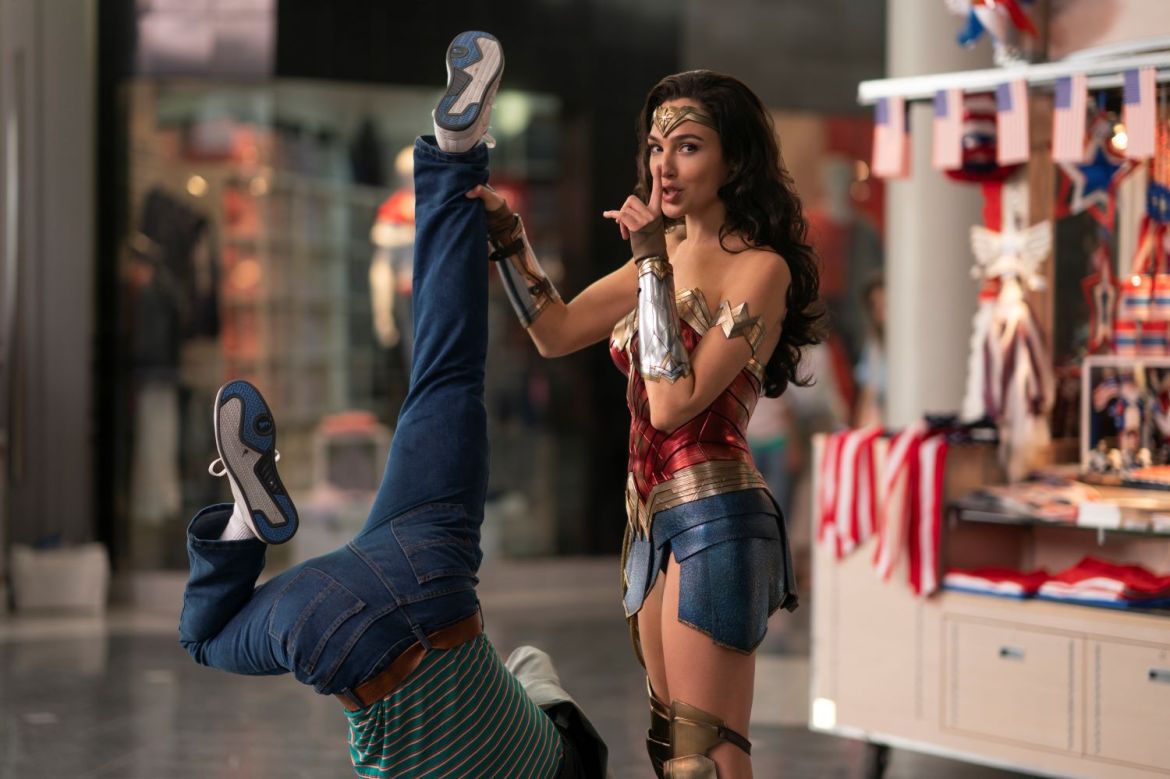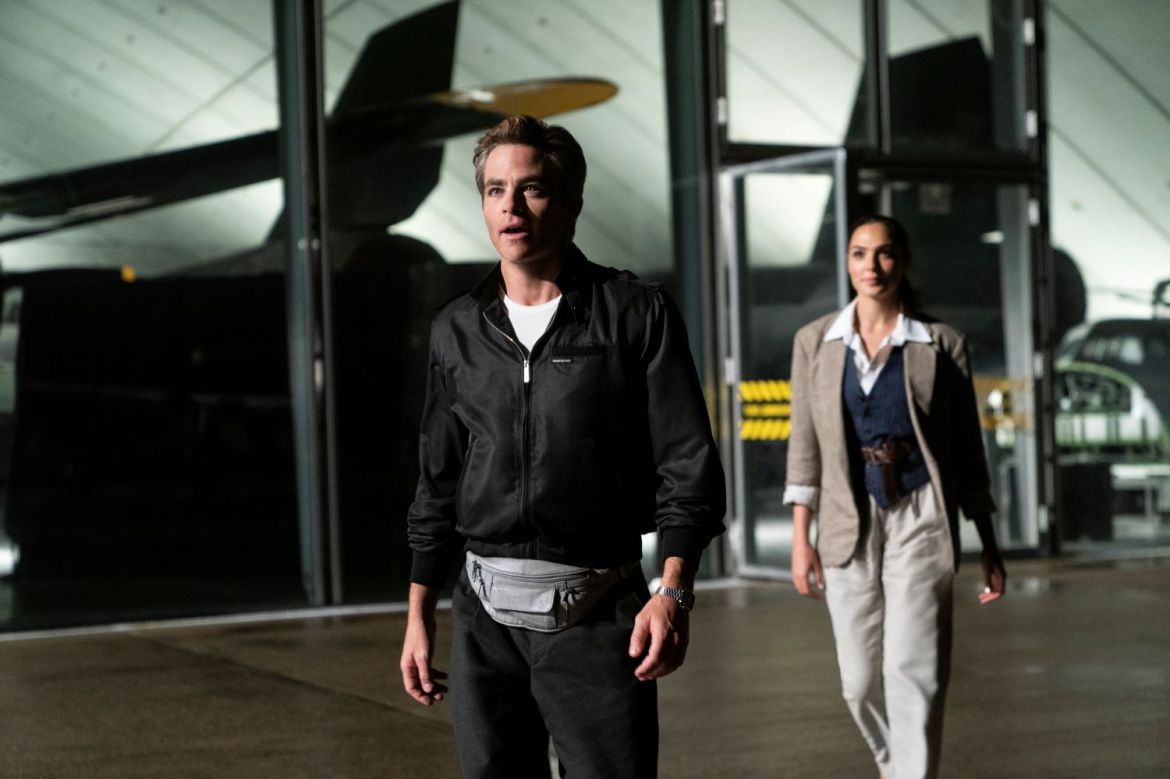
“It’s not about ‘deserve,’ it’s about what you believe. And I believe in love,” Diana Prince told the god of war in the climactic fight at the end of 2017’s Wonder Woman. Four years (or about 65 in her timeline) later, our heroine returns to protect a world who does not deserve her in Wonder Woman 1984.
Much has been written — and even more said — about Patty Jenkins’ sequel to the DCEU’s best film. And a lot of it is true. This weird, messy movie is silly, at times unpolished, and certainly not dripping with as much 80s nostalgia as the title seems to promise. But there are many wonderful moments contained within this charming gift of cinema, and this is a film that deserves to be celebrated.
World War I is long over and Diana (Gal Gadot) is an anthropologist in Washington, DC. She spends her days fending off drooling men as she goes about her work at the Smithsonian. Her evenings are for thinking about her long lost love, Steve Trevor (Chris Pine). Diana is also an occasional vigilante crimefighter and we catch up with her “modern day” self as she thwarts a robbery at the mall. A news reporter explains this is the sixth such appearance of the mystery hero, which begs the question: what has Diana been doing for the last 65 years?
To the outside world, Diana is cool, calm, and confident. She seems to breeze through the world without worry. But her life is sprinkled with signs of loneliness and isolation. Photos around her spacious high-rise apartment confirm that she stayed close with her war buddies until the last of them was gone, and those losses probably instilled a reluctance for the immortal Themysciran to get close to anyone new. As too many filmmakers rely on telling the audience everything they need to know and making sure their clear messages aren’t missed, it’s refreshing that so much of Wonder Woman 1984 relies on the audience to pay attention.

Diana does strike up something of a friendship with a new colleague, Dr. Barbara Minerva (Kristen Wiig), an awkward gemologist/archeologist/part-time cryptozoologist who struggles to be noticed by anyone at work, including the woman who hired her. They get to talking over a stone the FBI recovered in a robbery. The ordinary stone turns out to be the very extraordinary Dreamstone a monkey’s paw-type object that unleashes havoc by granting wishes in exchange for something the wisher values most. The discovery of the stone ushers in the arrival of Maxwell Lord (Pedro Pascal), a schemer who promises untold wealth without effort.

Max Lord’s get-rich-quick TV commercials are some of the strongest references to the 1980s and strike at the heart of why it made sense for Jenkins to set the film in 1984. The decade that marked the rise of Generation X is most often identified with the birth of MTV and the decline of the Soviet Union. More than thirty years later, we now have a clearer focus on the lasting damage done by delayed response to the AIDS crisis and the defunding of mental health services. But the economic culture, symbolized by yuppies and material excess, is frequently referenced in today’s popular media as a punchline rather than as an ideology begging to be interrogated.
Wonder Woman 1984, for all its light-hearted fun, uses that “have it all” mentality to motivate its central antagonists, and to drive the story forward as Max is able to convince the world to join him in his quest for power and success. It is also a mentality that tempts Diana and stops her from asking questions when Steve mysteriously returns to her in the body of a stranger known only as Handsome Man. Who is he? Why his body? Where does he go while Steve is inhabiting his form? Diana doesn’t ask because she doesn’t want to know. She only wants Steve and accepts the gift, ignoring her aunt Antiope’s long-ago lesson that “no true hero is born from lies.”
And the promise of having it all corrupts sweet, insecure Barbara as she just wants to be more like her statuesque, confident friend, until she learns even Diana really doesn’t have everything. Max has grand schemes of world domination and Barbara’s main aim is simply to control her own destiny. They both make terrible and dangerous choices in pursuit of their goals. But they also become victims of their own desires. Diana, whose primary motivation has always been love, keeps herself rooted in her love for humanity, even while living her own dream. It is also love that makes her the right hero to square off against these two quasi-villains whose aims are based in their need for human connection.
Wonder Woman 1984 isn’t perfect. It leaves a lot unanswered about the state of the world from 1918 to 1984. Was there a World War II? Did Vietnam happen? What about the Civil Rights Movement and the Cold War and the Berlin Wall? We are dropped into a world that looks a whole lot like the 1984 of my memory. The space program is alive and oil rights are a point of political contention in the Middle East. What was Diana doing all that time? There is something to be said for the wondering. Unanswered questions leave a lot of room for speculation and interpretation. But in the case of 1984, a title that is a not-so-subtle reference to George Orwell’s dystopian novel about a perpetual war, it would have helped to fill in a few of the gaps.

Likewise, it might have been valuable for Diana and Steve to spend some time considering what happened to the Handsome Man and the moral implications of accepting his vacated body. It isn’t until Diana realizes she has given up her own powers in exchange that she begins to reckon with the selfishness of the gift. The point Jenkins and her co-writers want to make is a callback to Diana’s childhood lesson: that she can’t win if she cheats, and Steve’s return could only happen by cheating. It is a message Jenkins trusts the audience to understand. But based on the discourse that followed after the film’s initial release, she might have trusted a bit too much.
Wonder Woman 1984 is a joyous effort to make superhero movies fun again. In an era of increasingly dark explorations of the pathos of certain caped crusaders, Patty Jenkins gives us back so many of the things that made comic book stories so entertaining in the first place. We can’t wait to see where Diana goes next.

